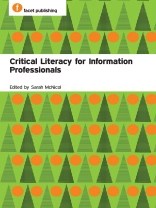This edited collection explores critical literacy theory and provides practical guidance to how it can be taught and applied in libraries.
Critical literacy asks fundamental questions about our understanding of knowledge. Unlike more conventional approaches to literacy and resource evaluation, with critical literacy there is no single ‘correct’ way to read and respond to a text or resource. A commitment to equity and social justice sets critical literacy apart from many other types of literacy and links it to wider societal debates, such as internationalization, community cohesion and responses to disability.
The book provides a foundation of critical literacy theory, as applied to libraries; combines theory and practice to explore critical literacy in relation to different user groups, and offers practical ways to introduce critical literacy approaches in libraries.
Contributed to by international experts from across library sectors, the book covers topics including:
- radical information literacy as an approach to critical literacy education
- critical literacy and mature students
- physical and digital disability access in libraries
- teaching critical literacy skills in a multicultural, multilingual school community
- teaching media literacy
- developing critical literacy skills in an online environment
- new media and critical literacy.
Critical Literacy for Information Professionals also contains a series of practically-focussed case studies that describe tools or approaches that librarians have used to engage users in critical literacy. Drawing on examples from across library sectors including schools, public libraries, universities, workplaces and healthcare, these illustrate how critical literacy can be applied across a variety of library settings, including online and new media environments.
Accessible to those with little knowledge of critical literacy, while also introducing debates and ideas to those with more experience of the field, this book will be essential reading for librarians, information professionals and managers in all sectors, students of library and information science, school and higher education teachers and researchers.
Innehållsförteckning
Introduction – Sarah Mc Nicol PART 1: THEORIES OF CRITICAL LITERACY 1. Renegotiating the place of fiction in libraries through critical literacy – Sarah Mc Nicol 2. Death of the Author(ity): Repositioning students as constructors of meaning in information literacy instruction – Jessica Critten 3. Reading health education comics critically, challenging power relationships – Sarah Mc Nicol 4. Reframing librarian approaches to international student information literacy through the lens of New Literacy Studies – Alison Hicks 5. Using new literacies to discuss disability in the library – JJ Pionke 6. “Anyone can cook”: critical literacy in the workplace – Andrew Whitworth 7. Social justice, adult learning and critical literacy – Jennifer Lau-Bond PART 2: CRITICAL LITERACY IN PRACTICE 8. A Picture is Worth a Thousand Words: Teaching Media Literacy – Michael Cherry 9. Curricular and extra-curricular opportunities to engage school students in critical literacy in England – Rebecca Jones 10. New media and critical literacy in secondary schools – Joel Crowley 11. Critical literacy and academic honesty: a school librarian’s role and contribution – Anthony Tilke 12. Engaging Undergraduate Communications Students in critical information literacy – Rachel Elizabeth Scott 13. Exploring pedagogical implications of students’ search mediation experiences though the lens of critical information literacy – Sarah Clark 14. Diffusing critical web literacy in a teacher education setting: initial reflections and future planning – Evangelia Bougatzeli and Efi Papadimitriou
Om författaren
Sarah Mc Nicol is is a research associate at the Education and Social Research Institute, Manchester Metropolitan University, UK. She has worked as an Information Studies researcher since 2000, and has particular interests in information literacy; lifelong learning; and school and children’s libraries. She has published widely in the information studies field and has previously guest edited a number of journals including Library Review and Library Trends.












